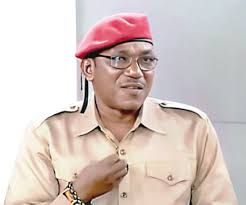Solomon Dalung, former Minister of Youth and Sports, has condemned the powerbrokers surrounding President Bola Tinubu, calling them “more dangerous” and “sophisticated” than the ones that dominated former President Muhammadu Buhari’s administration. Dalung, speaking during an appearance on Channels Television’s Politics Today, did not hold back, suggesting that the strength and sophistication of the cabals around Tinubu have transformed the government’s power dynamics in a dangerous direction.
Dalung, who served in Buhari’s cabinet, explained that the cabals around Buhari were relatively less educated and lacked deep experience in governance, suggesting that their hold over the administration was more primitive and narrowly focused. By contrast, Dalung accused the individuals within Tinubu’s circles of being power-hungry, educated, and more astute in handling the levers of political and administrative authority.
Drawing comparisons to the previous administration, the former minister declared, “Of course, President Muhammadu Buhari’s government had cabals, that is known and I have attested to. But I am saying that President Muhammadu Buhari’s cabals were made up of people who were not quite informed, with little experience in politics, public administration, and governance.”
Dalung further elaborated, stating that while the Buhari administration’s cabals were preoccupied with self-interest and the control of public funds, the more sophisticated group around Tinubu is inclined to manipulate political power at a far deeper level. “The cabal surrounding President Bola Ahmed Tinubu is made up of sophisticated and ambitious people who have a long history in power,” Dalung said.
The former minister’s assertion highlights the growing suspicion and uncertainty surrounding the current administration, as well as the overwhelming influence exerted by these unnamed but influential figures. In contrast to previous claims by President Tinubu, who in July 2024 publicly rejected the notion that his presidency was controlled by a cabal, Dalung suggests that the existing power structures could overshadow the officeholder.
In a key moment during his commentary, Dalung predicted that the power of Tinubu’s cabals, due to their extensive knowledge of governance and politics, would lead to more harmful consequences for the presidency. He described the power struggle as being characterized by members of the cabal controlling access to the President, often stifling information, and building invisible but very real barriers that obstructed the flow of vital political or security-related messages from reaching him.
“These cabals are masters,” Dalung emphasized, hinting at a level of control over political and institutional processes that could undermine the effectiveness of the presidency. “They have sound knowledge of what power is,” he continued, making it clear that this experienced group was proficient at manipulating both public opinion and governmental functions.
In his statement, Dalung alluded to the former administration’s lack of deep knowledge in these areas, making it harder for them to exert the same level of dominance and control seen in Tinubu’s current government. “Buhari’s cabals were more about their personal gain. They didn’t necessarily pose a serious threat to the system itself,” Dalung concluded. “But with Tinubu’s cabals, we are looking at a different level of sophistication in governance.”
Dalung’s comments add to an already tense atmosphere in the country, as critics and opposition groups have increasingly questioned the direction in which Tinubu’s leadership is heading. There is mounting concern that the President’s authority might be being usurped by these influential figures, a matter of particular concern for a country grappling with issues ranging from economic hardship to political instability.
It remains to be seen how these comments will play out in the wider political landscape, with many wondering whether Dalung’s harsh words will spark a broader discussion about the transparency, accountability, and concentration of power in Nigeria’s highest offices.
The legacy of Buhari’s administration was often clouded by accusations of nepotism and the influence of his trusted inner circle, but Dalung’s characterisation of Tinubu’s cabals as “more dangerous” poses an unprecedented level of alarm regarding the concentration of power under the new administration.
While Buhari repeatedly stated in public speeches that his government faced internal power struggles, Dalung suggests that the problem had more far-reaching consequences. Buhari’s perceived weakness to reign in his powerful allies contributed to many of the challenges his administration faced in the eyes of the public.
Furthermore, Dalung’s accusations draw attention to the lingering issue of governance in post-2019 Nigeria, where power has increasingly been seen as concentrated in the hands of a few individuals, whether in the form of presidential advisors or factions within political parties. Even with Tinubu’s widespread popularity after a hard-fought 2023 election, critics are beginning to voice concerns that his administration is being hijacked by an elite group.
Whether this undercurrent of secrecy, elite influence, and internal political manipulation will turn into a larger political scandal remains to be seen. What is clear, however, is the growing divide between the masses and an elite that seems less concerned with national governance and more invested in maintaining control for themselves.
For now, Tinubu’s presidency faces an intricate challenge: How to manage these powerful forces, continue efforts of governance, and avoid repeating the mistakes of his predecessors by keeping his administration transparent and accessible to the Nigerian people.

